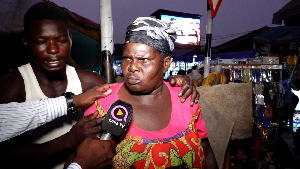Government & The Citizenry
By Innocent Samuel Appiah
THE CHAIRMAN of the Public Services Commission (PSC) Mrs. Bridget Katsriku has observed that a Freedom of Information Act will signal a new rapport between government and the citizenry, a link which would see the public as rightful stakeholders in the administration of the country, demanding as of right, information that they require to permit them contribute their quota to the country’s development, stressing that this will be another giant step towards the growth of the country’s fledging democracy.
“For as our democracy grows, so also do expectations from the citizens for accountability from public servants in handling the affairs of the state. To pursue the policy of good governance therefore, information and how it is kept, is crucial. Indeed, a democratic dispensation such as the one we are operating, information has to be made available, not only for critical decision making at the right time, but also be accessible, and properly managed to ensure their security as well as the security of the country as a whole,” she noted.
Mrs. Katsriku made the observation at the 15th annual lecture of the Commission in Accra, which was under the theme; “Improving Information and Security Management for Good Governance,” with the main topic on ‘Managing Data and Information for Effective Performance in Public Service Organizations: Dilemmas, Challenges and Prospects.’ Other topic was ‘Information security and management for sustainable democracy: Challenges and the way forward.’
The annual lecture, which was launched in 1998 by the PSC, seeks to create a public service platform where topical strategic issues, bearing on national development generally and on the public services in particular, could be freely and frankly discussed and debated. It also aims at craving for an interactive relationship involving the Commission, its client organizations, civil society and the public at large; and the urge to contribute to the promotion and entrenchment of a culture of information sharing and dissemination within Ghanaian society.
The Commission recognizes that good governance demands access to credible knowledge and information on major national issues should not be restricted to the privilege few who, by ransom of their office, functions or responsibilities, have some direct or indirect role to play in the handling of these issues.
It is the believe of the Commission that the gains to be derived from the annual lecture programme can be best measured, not in the immediate term, but in the medium to long term, and as they continue to sustain the programme, the Commission hopes to be able to develop authoritative literature on the unfolding perceptions and concerns of informed Ghanaian society over matters of national and public interest. This literature, together with inputs from other similar local endeavours, should provide posterity with the legacy of gathering ideas and insights which would broaden and deepen their mental horizon and in particular, enrich their sense of history.
Mrs. Katsriku noted that records and information management in the Ghana Public Service (GPS) pose a big challenge to the accomplishment of good governance, stressing that the challenges relate to availability, reliability, authenticity, integrity and accessibility of data and information for policy planning, implementation, monitoring and evaluation and for decision making, generally.
“There is no doubt that a well-managed credible, readily available and robust information and security management system, promotes integrity, timely public service delivery, accountability, transparency and openness. It also helps to ensure that Public Service Organizations have the right information, available at the right time, in the right place, for use by numerous stakeholders, including civil society organizations, the private sector, the media and citizens as we all work together towards nation-building, growth and development,” she maintained.
Mrs. Katsriku added; “Indeed, information is the currency of democracy. The value of information is directly related to its accessibility. Without access to information there is no transparency and accountability democracy bleeds to death.”
Dr. Emmanuel Kwesi Aning, Director and Dean of the Faculty of Academic Affairs and Research at the Kofi Annan International Peace-Keeping Training Centre, stated that sustainable democracy can be achieved through citizen’s participation in peace and security building and that the last decade had seen the ICT and networked technologies contributing to this innovative development in Ghana’s democracy dispensation.
He indicated that research recently undertaken in Ghana had a unique experiment using information technology to enhance democracy, and that they established a weblink between parts of the Northern Ghana and Parliament. According to him, this internet site allowed citizens to access bills currently before Parliament and made it possible for them to communicate directly with elected officials.
“But the key issue of importance in information security studies and management is the fact that the internet, networked technologies and the emerging ICT systems pose both opportunities and threats for the sustainability of democracy, especially in regions undergoing democratic transitions, and where there is an abiding mistrust among political settlements, defined as ‘the forging of a common understanding usually between political elites, that their best interest or beliefs are served through acquiescence to a framework for administering political power,” he intimated.
Dr. Aning noted that the significance of securing and protecting public sector data is critical for sustainable democracy, and that the goal of information security management is to ensure confidentiality, integrity, and availability of information, stressing that the government, the civil societies, public sector employees, stakeholders and the citizens have critical, but differential roles to play in the management of information security.
A former Director of the Public Records and Archives Administration Department (PRAAD), Dr. Cletus A. Azangweo said poorly kept records result in inaccurate or incomplete data, which can lead to misunderstanding and misuse of information, cover-up of fraud, skewed findings and statistics, misguided policy recommendations and misplaced funding, all with serious consequences for citizens’ lives.
“An important issue therefore, in the management of data is that of ‘traceability’ (an organization’s ability to trace data back to the source records from which they are derived). In other words, there is the need to ask the questions – can the records from which the data are derived be trusted? Are they complete? Are they authentic? How were they generated, by whom and in what conditions? Is there sufficient contextual information to enable them to be understood?” he asked.
Dr. Azangweo who was also Records Officer for the IMF, said therefore, the degree to which open data initiatives will provide a means of holding governments to account will depend upon the degree to which governments are able and willing to manage their public records, emphasizing that the effective management of data and information can ensure that the public service is performing effectively and consistently with the GPS values
He maintained that no government could survive without written records; no office could operate successfully if it had to rely on memory alone for keeping track of every transaction; and that without records and speedy access to them, all organized administration would quickly come to a halt.
Dr. Azangweo that records, and the information they contain, are a vital resource and they must therefore, be managed systematically, saying; “Our efforts at promoting accountability and transparency in support of good governance could/would be greatly compromised if not impeded, without proper records management.”
General News of Saturday, 16 June 2012
Source: Innocent Samuel Appiah












